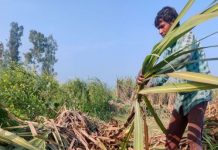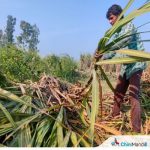In Uttar Pradesh’s Hapur district, farmers are selling their stubble and sugarcane leaves for biomass briquettes (fuel) at rupees two to three per kilogram. This initiative will allow farmers to avoid burning these materials in their fields, helping protect the environment and relieving them from legal actions related to stubble burning monitored via satellite.
Additionally, as per experts this approach prevents negative effects on soil health.
Vaibhav Garg, the factory director where biomass briquettes are produced, spoke to ANI about the ongoing issue of stubble burning. He said, “Our sole aim is to make India pollution-free. Currently, the problem of stubble burning is increasing significantly, especially in Punjab and Uttar Pradesh, where farmers burn the stubble. Instead of burning, we prefer to buy it from farmers, pay them, and then produce biomass briquettes from it. These briquettes are used by both private and government industries.”
The factory supplies thousands of tons of material to the Delhi NCR and surrounding areas and has also sent some to Himachal Pradesh.
Garg added, “I request that we raise awareness among farmers so they send us as much stubble as possible. This way, we can increase our production and help protect the environment. I supply to several places, including Noida, Ghaziabad, Bahraich, and I have also sent material to Himachal Pradesh.”
Mukesh Garg, the factory manager, also spoke to ANI about the issue of burning stubble and sugarcane leaves. He said, “We started this plant in 2011 to address this problem. We crush sugarcane leaves and stubble to make biomass briquettes, which are used as fuel in the boiler industry. This process does not cause any pollution. We are buying stubble at Rs two per kilogram and sugarcane leaves at Rs three per kilogram from the farmers. We have also raised awareness among the administration about this issue, but we have not yet received any assistance from them.”
Every year, farmers face legal action for burning stubble and sugarcane leaves. Now, they can avoid burning these materials while profiting from their sale. This initiative aims to reduce pollution while providing a sustainable solution for farmers and the environment.
(With inputs ANI)












